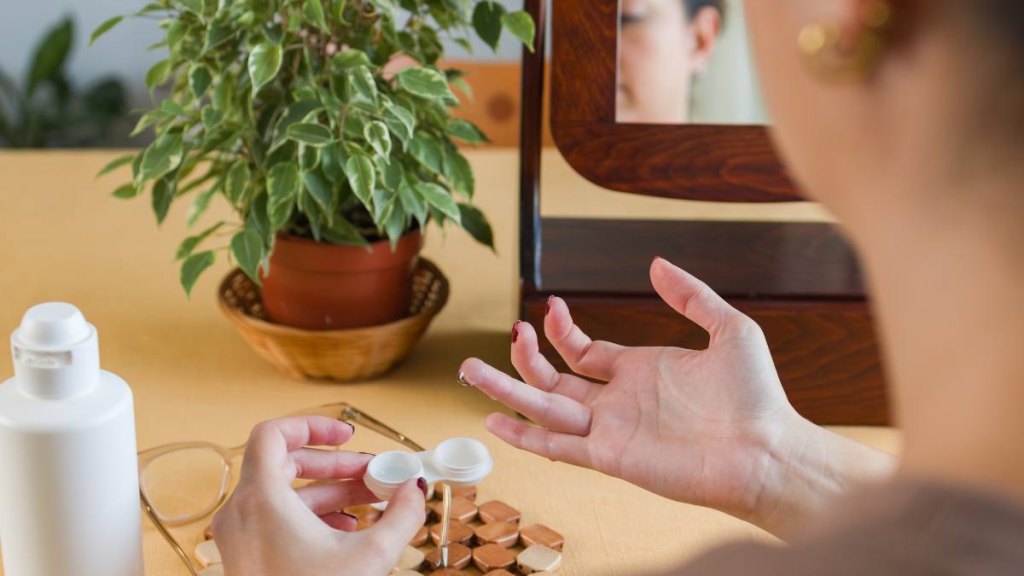Contact lenses are the obvious choice when you want to see clearly without anything resting on your face. While wearing them is convenient, they require proper cleaning and care to protect your vision. But what happens if you forget to take them out while bathing? Can you shower with contacts, or can doing so affect your sight? We turned to eye doctors to see whether or not contacts mix well with water and tips to prevent irritation and infections.
Can you shower with contacts?
The consensus from eye doctors is that you shouldn’t shower while wearing contacts. While it might be nice to see what you’re doing more clearly, it’s unsafe to keep contacts in if you’re going to be in water, whether bathing or swimming.
“Water can harbor dangerous bacteria, including a very destructive organism called acanthamoeba,” explains Dan Brocks, MD, chief medical officer at BostonSight. “If the bacteria or parasites get trapped underneath your contact lens, you could end up with a serious eye infection [called acanthamoeba keratitis] that has a high risk of causing blindness.”
Hot showers aren’t ideal for contact wearers, either. “The steam can cause your contact lens to adhere to the cornea,” adds Diane Hilal-Campo, MD, a board-certified ophthalmologist and founder of Twenty/Twenty Beauty. “It can lead to microabrasions, allowing contaminants in the tap water to get stuck between your lens and the eye, which increases your risk of irritation, infections and abrasions.”
If the contact fuses to your eye, removing it can be uncomfortable and challenging. Dr. Hilal-Campo notes that if this happens, it’s crucial not to force the contact lens off the eye.
Symptoms of an eye infection from showering with contacts
You can expect some irritation when you shower with contacts in, and Dr. Hilal-Campo shares that redness and discomfort are typical for an hour or so. However, “if it lasts longer, or your eye is very red, uncomfortable, tearing up, crusting, feels ‘gritty’ or sensitive to light, you may have an eye infection.” In that case, make an appointment with your eye doctor right away.
What to do if you accidentally shower with contacts in

While showering with contacts isn’t ideal, it sometimes happens. So, how can you prevent damage to your vision?
If you accidentally keep your contacts in, closing your eyes in the shower can help, says Dr. Hilal-Campo. And avoid trying to remove them immediately after stepping out of the shower. Instead, “lubricate with rewetting drops to help rebalance and rehydrate the lens, which will help return them to their original state and make them more comfortable,” she advises.
Dr. Brocks also suggests wearing daily contact lenses so you can dispose of them right away. He explains that this lowers the risk of unwanted bacteria spreading to various parts of the eye.
Swimming with contacts is also a bad idea
Whether you’re in a pool, hot tub, ocean or lake, the water will contain minerals, chemicals, bacteria, acanthamoeba and particles that can irritate and negatively affect the eye, says Dr. Hilal-Campo.
Bacteria can spread easily in bodies of water. So, instead of wearing your contact lenses, you could try goggles or prescription goggles. “They’ll create a tight seal around the eye that’ll prevent any water from getting into the eye as well as provide UV protection,” says Dr. Hilal-Campo. “You’ll be able to see perfectly and safely under the water with a pair of prescription goggles, no matter where you’re swimming.”
Other safety tips for contact wearers

Contact lenses aren’t meant to be worn in the shower and they’re also not meant to be worn all day every day. Give your eyes a rest! Dr. Brocks recommends putting on your glasses if you’re home for the rest of the night or staying home for a longer period. “Reducing your contact lens wear time will reduce your risks and improve the long-term health of your eye.”
Also, opt for daily lenses that you can dispose of instead of those with extended wear time. Lastly, experts agree that sleeping with your contacts in should be avoided as it’s highly risky and associated with corneal infections or vision loss and blindness.
This content is not a substitute for professional medical advice or diagnosis. Always consult your physician before pursuing any treatment plan.




